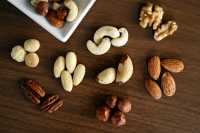Author Interviews, BMJ, Brigham & Women's - Harvard, Nutrition, Weight Research / 24.09.2019
Snacking on Nuts Better for Weight Control than Chips
MedicalResearch.com Interview with:
Deirdre K Tobias, ScD
Associate Epidemiologist, Brigham and Women’s Hospital
Assistant Professor, Harvard Medical School
 MedicalResearch.com: What is the background for this study? What types of nuts are helpful? Peanuts included?
Response: We did not have the granularity in our study to evaluate too many individual nut types, and did not perform head-to-head comparisons between types of nuts. All seemed to be better for long-term weight control compared with the snacks like potato chips that we know are not great for us on a regular basis.
(more…)
MedicalResearch.com: What is the background for this study? What types of nuts are helpful? Peanuts included?
Response: We did not have the granularity in our study to evaluate too many individual nut types, and did not perform head-to-head comparisons between types of nuts. All seemed to be better for long-term weight control compared with the snacks like potato chips that we know are not great for us on a regular basis.
(more…)
 MedicalResearch.com: What is the background for this study? What types of nuts are helpful? Peanuts included?
Response: We did not have the granularity in our study to evaluate too many individual nut types, and did not perform head-to-head comparisons between types of nuts. All seemed to be better for long-term weight control compared with the snacks like potato chips that we know are not great for us on a regular basis.
(more…)
MedicalResearch.com: What is the background for this study? What types of nuts are helpful? Peanuts included?
Response: We did not have the granularity in our study to evaluate too many individual nut types, and did not perform head-to-head comparisons between types of nuts. All seemed to be better for long-term weight control compared with the snacks like potato chips that we know are not great for us on a regular basis.
(more…)



